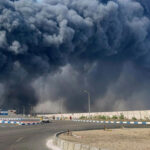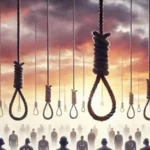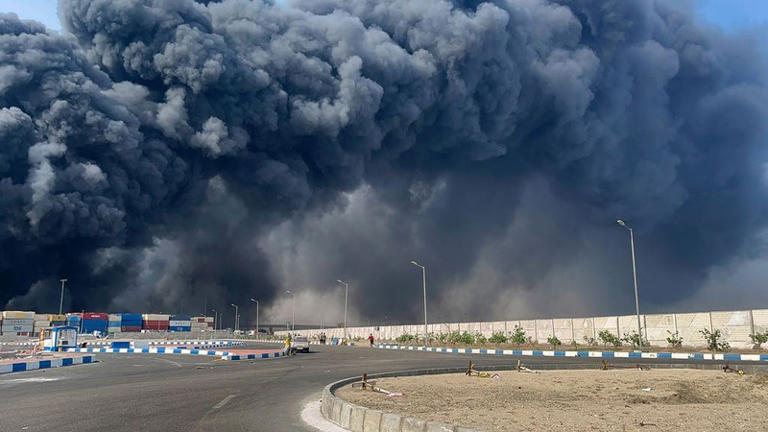
On this International Workers’ Memorial Day, Iran is reeling in the immediate aftermath of the latest in an all too long line of disasters to have befallen its long-beleaguered working people.
Over the weekend just passed, international news outlets have extensively reported on the immediate fallout from a huge explosion at around midday local time on Saturday 26 April after flames appeared to have broken out among shipping containers at the Shahid Rajai commercial quay, located 23 kilometres west of the southern port city of Bandar Abbas.
Harrowing footage circulating online appears to show the flames spreading to other containers as dockworkers and those immediately in the vicinity desperately ran for their lives before a massive explosion cut the video feeds. The explosion was of such a scale that blast waves tore through anything or anyone unfortunate enough to be present in the immediate vicinity and were felt within a wider 50-kilometre radius as well as being audible many miles away while a thick plume of acrid black smoke continues to billow into the sky over the site.
By today (Monday 28 April), the death toll had climbed to at least 70 with 1,200 injured, many critically so. Iranian authorities have stated that they expect these figures to rise further in the days ahead. It should be noted that many dockworkers and employees of the companies operating within the Shahid Rajai quay complex remain unaccounted for, with hopes for their safe return diminishing with every passing hour.
According to the head of the Iranian Red Crescent Society, several rapid response teams, including rescue and relief teams and ambulance crews, were dispatched to the scene as the incident unfolded to provide emergency assistance to those immediately caught up, while further relief and firefighting efforts operations continued into the following day. Many of the injured were medically evacuated to hospitals in major cities in Hormozgan province and throughout southern Iran.
As the blaze spread to engulf thousands of containers in the quay, one of Iran’s main commercial ports, the smoke from the blaze continued to rise and turn the sky black over Bandar Abbas and the surrounding districts leading to the closure of all schools, universities, and government offices and raising fears of an impending environmental disaster on top of Saturday’s tragedy. The release of noxious gases and toxic pollutants into the atmosphere pose an immediate and very real threat to the area’s inhabitants, especially children, the elderly, and infirm – particularly those already suffering from respiratory illnesses. The area around Bandar Abbas is already blighted by extreme poverty and hardship – bad even in comparison with the rest of Iran – with at least half the population estimated to be living on the margins and in informal settlements (read slums) and struggling to meet their most basic needs.
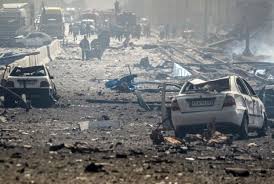
The cause of this disaster, one of the worst but by no means only industrial disasters in recent years, continues to be speculated over. While the Iranian people await the outcome of transparent and independent investigations into what exactly took place at the complex, fingers are already pointing towards the at-least reckless transferral and storing of dangerously unstable chemical materials, possibly for use in military armaments, at the site.
If this is indeed the case, it would mark the latest glaring example of utter disregard for the lives and safety of Iranian workers and civilians alike on the part of the ruling Islamic Republic regime, made all the more worse given that the facility, adjacent to the Strait of Hormuz, is a vital hub in Iran’s commercial and import infrastructure with almost 80% of the country’s container activities being handled there – including a significant proportion of the country’s import of staples such as wheat and vegetable oil.
There are even growing concerns that the incident may well have knock-on effect on the cost of some staple goods throughout Iran amid already spiralling inflation and an acute poverty crisis in the country.
“99% of the victims were workers!”
Mr. Esmail Mohammadzadeh, a prominent labour activist and representative for employees of the dock companies situated at Shahid Rajai quay, is believed to be among the missing. This popular worker has not been heard from since the explosion and his family and loved ones eagerly await word of his whereabouts and fate.
Mr. Arsalan Heydari, a long-time labour activist in Bandar Abbas and currently the head of the city’s Labour Retirees Association, also spoke to Iranian Labour News Agency (ILNA) about the explosion’s disastrous toll on the workers at the port: “Shahid Rajai quay is the size of a city, it is very large, and the number of workers employed there is over 7,000. Unfortunately, 99 percent of the victims of the accident were workers; everyone there at the quay was a worker, both men and women, and they were present and attending at the time of the incident.
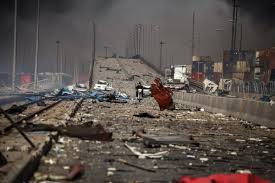
“We had already repeatedly warned that more attention needed to be paid to the safety of dockworkers, but our voices were not heard […] There are workers here who do not even have safety helmets or boots; the work environment is unsafe; well, this all adds up and one day it results in disaster. What has happened is heartbreaking; why are workers who are struggling to earn a living sacrificed like this? What sin have they committed?” remarked Mr. Heydari.
Another worker, who appeared to be experiencing difficulty talking, continually stammering and breaking off throughout his interview, said: “I am really not feeling well… All I will say is that we were working when the ‘big bang’ happened; it was if the end of the world was taking place right before my eyes… I saw colleagues laying [dead] in the corners; others flung through the air… Yes, it truly was the end of the world!”

The regime leaders must come clean!
While the exact cause of the fire and explosion remains unclear, the sheer severity and scope of the destruction indicate that the most basic laws, regulations, and protocols on the transportation and handling of hazardous materials – including those regarding unstable, inflammable, and potentially explosive substances – were not adhered to, if not wilfully disregarded. This is further underlined by the aforementioned fact that the Shahid Rajai quay is one of the country’s main commercial quays, as opposed to a designated military dock.
All available evidence and published news suggest that this disaster is not an isolated event but rather an example of the Islamic Republic’s wanton disregard for internationally recognised laws pertaining to the transportation and warehousing of chemical substances, as well as wider workplace safety regulations.
In demanding a thorough and transparent investigation into the causes of the Shahid Rajai quay disaster, attention must be drawn to the primary responsibility for this incident borne by the Supreme Leader’s government, the Islamic Revolutionary Guard Corps (IRGC), and the rentier companies affiliated with various institutions of the Islamic Republic regime that exercise control over the Rajai Port Special Economic Zone.
Yet again, the theocratic regime’s systemic failure has resulted in tragedy!
In an interview with ILNA, Mr. Saeed Jafari, CEO of Sina Marine and Port Services Development Company, the company overseeing operations in the part of the quay where the fire and explosion took place, stated: “According to the International Maritime Dangerous Goods Code, those in charge of and involved in the sea and land transportation of dangerous goods are obligated to declare such cargo, specifying its primary and secondary hazard classes and providing a safety data sheet, before the goods enter customs. This ensures that incoming cargo to ports is packaged and labelled in accordance with the requirements of the [said] regulations.
“Based on this, ports transfer dangerous goods to an area designated for the storage of hazardous materials, which is designed and constructed according to specific port zones in the port’s zoning plan.
“Unfortunately, the initial assessment and expert evaluation regarding yesterday’s incident at Shahid Rajai Port indicate that this tragic accident occurred due to a disastrous recurrence of the misdeclaration of dangerous goods and [thus] the delivery of these goods without the required dangerous goods documents and labels.
“The power and blast wave of the explosion, the radius of destruction, and other characteristics of yesterday’s explosion indicate highly dangerous cargo that, according to the FAL Convention [The Convention on Facilitation of International Maritime Traffic] and port laws and regulations, should have been declared in writing and officially to the port as dangerous goods by the shipping company. However, this cargo was declared, packaged, and delivered to the port as ordinary and non-hazardous goods.
“Unfortunately, this misdeclaration, by endangering the entire area from the ship to the warehouse in the port, led to this accident. Accordingly, Sina Marine and Port Services Development Company will pursue legal action,” concluded Mr. Jafari.
CODIR demands accountability and action!
Poignantly coinciding with International Workers’ Memorial Day, amid the rising death toll and number of horrific injuries arising from Saturday’s devastating fire and explosion at Shahid Rajai quay in the vicinity of Bandar Abbas, and the mounting indications of criminal recklessness on the part of the Islamic Republic authorities as to hazardous materials being transported and handled via the port, as well the loudening chorus of calls for accountability and justice by the Iranian people, CODIR demands that the authorities in Iran:
- Move quickly and decisively to bring the disastrous fire at the Shahid Rajai quay under control, as well as account for and recover all workers caught up in the tragedy.
- Take decisive measures to avert a disastrous environmental fallout from the incident.
- Grant full and frank disclosure to the public of all information it holds pertaining to the materials being transported in the shipping containers that ignited and detonated on Saturday 26 April and the sequence of events leading up to that point.
- Immediately give way to the holding of a full, independent, transparent, and unimpeded investigation into this incident and how it came to take place.
CODIR also implores the authorities in Iran to immediately adhere and give effect to the FAL Convention as well as all other relevant rules, regulations, and protocols drawn up and envisioned so as to prevent such tragedies from occurring in the first place.
CODIR once more laments that under the Islamic Republic, despite the size and scope of Iran’s industries, there is no proper mechanism for the monitoring and ensuring of compliance with health and safety or organisational/institutional setup tasked with such. It is against such a precarious backdrop – with the lives, safety and wellbeing of Iranian workers figuring as an afterthought at best – that disasters like the one at Shahid Rajai quay are able to take place.
Closely linked with this is the continued complete prohibition on the establishing and operating of bona fide independent trade unions in Iran or participation in such activities, and the brutal repression by the ruling regime and its security forces of anyone attempting to do so.
Therefore, CODIR calls upon the IndustriALL the global trade union, as well as other international labour unions, to firmly take the theocratic regime in Iran to task and put pressure on it to implement and adhere to Conventions 87 and 98 of the International Labour Organisation (ILO), to which it is a signatory – and indeed a founding member.
CODIR has called on trade unions and labour organisations to write to the embassies of the Islamic Republic of Iran (Please see below for the address for the Iranian Embassy in Britain) to make clear their outrage about the current situation of labour rights in Iran and demand that the Iranian government takes steps to implement fully all ILO Conventions to which it is a signatory.
Mr. Seyyed Ali Mousavi, Ambassador
Embassy of the Islamic Republic of Iran
16 Princes Gate
LONDON
SW7 1PT
Email: [email protected]
Published: 28 April 2025












 Posted in
Posted in 
